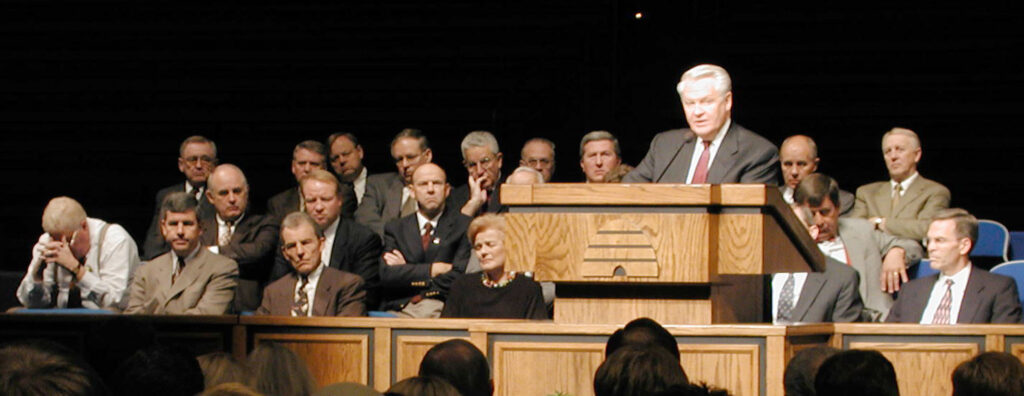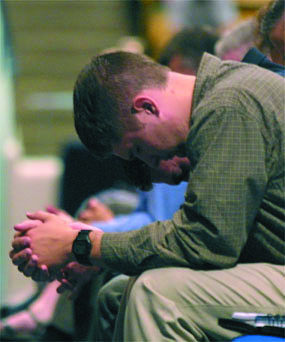Shocking. Sobering. Sickening. These are the words with which the BYU community remembers 9/11.
Bill Brady retains a vivid memory of that day on campus two decades ago. Brady, a student and BYU Magazine writer at the time, had just arrived for work at the old alumni house when he found people enclosed around a TV in a large conference room. Brady and the campus community watched in horror as Al-Qaeda terrorists plowed United Airlines Flight 175 into the World Trade Center South Tower.

“It was just a sober, shocking experience,” Brady said, now a resident of Alpine. “It was just quiet as we walked across campus to go to the Tuesday devotional. The usual energy and excitement on the campus was gone.”
The 9/11 experience touched and changed the lives of the 2001 Fall Semester BYU student body.
Twenty years after that tumultuous time, those BYU students reverently remember their 9/11 experiences and continue to apply the lessons they learned then to an increasingly turbulent world today.
A changed nation
The horrific events of Sept. 11, 2001 forever changed American defense policies.
BYU political science professor Celeste Beesley teaches POLI 476, a class in which students study the impacts of terrorism and counterterrorism.
“Before 9/11, it wasn’t that people didn’t worry or care about terrorism,” Beesley said. “It’s just that 9/11 reset public and government thinking about how costly — in terms of life and economic impact — terrorism can be.”
Beesley explained that before 9/11, foreign governments were viewed as the primary threat to U.S. security. Following the attacks on Sept. 11, 2001, that attitude quickly evolved.
“After 9/11, there was an increase in awareness and concern about the threat that non-state actors pose to governments,” Beesley said. “It was realized that non-state actors and small groups without a lot of money or resources can actually present a threat to the United States.”

New York City’s skyline is joined by twin pillars of light in memorial of the World Trade Center. (AP Photo/Stefan Jeremiah, File)
BYU and 9/11
Tiffany Gee Lewis, then a reporter for The Daily Universe, recalls crowds of students in the Wilkinson Center, riveted to a TV as they watched the attacks unfold in real time.
“It was eerie. Everything on campus came to a standstill,” said Gee Lewis, now a resident of Eugene, Oregon. “I still feel the surge of adrenaline I felt that day.”
The Daily Universe published student’s reactions to the terrorist acts in its Sept. 12, 2001 issue:
“At first I didn’t realize it was serious,” said Julianne Smith, then a graduate student from Arizona. “But now, going on with normal life seems strange.”
“It couldn’t happen here,” said Nathan L. Gend, a freshman from Washington majoring in communications at the time. “I thought no one could touch (the U.S.), but we sure got touched today.”

Author Naomi Schaefer Riley will always remember 9/11 colliding with her first experience at BYU. Schaefer Riley had come to campus from New York City to research BYU for her book “God on the Quad: How Religious Colleges and the Missionary Generation are Changing America.”
As Schaefer Riley watched her home come under attack, her thoughts turned immediately to her loved ones in New York, particularly her boyfriend who worked across from the World Trade Center.
“BYU was quite foreign to me … but I had the feeling that people around me were in some ways just as wounded as I,” Schaefer Riley said. The BYU community knew Schaefer Riley was from New York and extended her compassion at such a fearful time.
BYU alumnus Chris Carlson was an eyewitness to the 9/11 attacks and shared his first-hand experience with The Daily Universe as printed in the Sept. 12, 2001 edition.
“Right when the plane hit, I could see people falling out of the building,” Carlson said. “I was just sick to my stomach. I’ve seen people die today.”
The Daily Universe reported on Sept. 12, 2001 that 35 active BYU students were in New York City or Washington at the time and went unharmed.
Words of comfort
The combined attacks on the World Trade Center, Pentagon and the crash of United Airlines Flight 93 in Shanksville, Pennsylvania, claimed nearly 3,000 lives in total.
While these calamitous events shattered through TV screens and filled lives with splinters of grief, fear and uncertainty, BYU students solemnly filled the Marriott Center to hear the fall semester’s opening devotional address from then-President Merrill J. Bateman.
President Bateman altered his original message to offer students one of peace and hope.

“Even though we live in troubled times . . . it is possible for each of us to feel peace, to have the peace of the gospel in our lives,” President Bateman said.
President Bateman further counseled BYU students to respond to the tragedy by continuing to love and respect all people while more fully embracing the good news of the gospel of Jesus Christ.
President Gordon B. Hinckley offered similar comfort to the world that evening in a special devotional held at the Salt Lake Tabernacle. The Sept. 12, 2001 edition of The Daily Universe included President Hinckley’s remarks:
“But dark as is this hour, there is shining through the heavy overcast of sorrow and anger, the solemn and wonderful image of the Son of God, the Savior of the world, the Prince of Peace,” President Hinckley said. “And it is to him we look to in these circumstances.”
Lessons for today
The BYU students of Fall Semester 2001 have the scenes and feelings of 9/11 taped in their minds, but perhaps more importantly, they have the lessons of 9/11 written on their hearts.
Twenty years later, those lessons learned in tumultuous and uncertain times may have special applicability to another BYU student body; a community of young adults wading through a worldwide pandemic with all its associated fears and uncertainties.

“The world really did change,” Gee Lewis said. “There was a shattering of innocence. While that was jarring, it gave us a choice. We could go forward in a sense of anxiety and panic or we could recognize that this is a situation very much out of our control, and that it doesn’t have to control the choices we make.”
Gee Lewis encourages BYU students to move forward in their pursuits while embracing rather than fearing an uncertain future.
“We had a job to do. What is your job right now?” Gee Lewis said. “What are you called to do? How are you going to put your mark on what’s happening now?”
Brady remembers overcoming post-9/11 fear and uncertainty by holding tight to his testimony of the gospel of Jesus Christ.
“Always maintain the perspective of who is in charge and what’s important,” Brady said. “It’s essential that we keep that eternal perspective.”
Three years removed from 9/11, on Sept. 12, 2004, Elder Jeffrey R. Holland of the Quorum of the Twelve would speak at a BYU-hosted fireside about the uncertainty that filled the world that day.
“We must never, in any age or circumstance, let fear and the father of fear (Satan himself) divert us from our faith and faithful living,” Elder Holland said. “There have always been questions about the future. Every young person or every young couple in every era has had to walk by faith into what has always been some uncertainty.”
Elder Holland called on his young adult audience to be faithful and remember that God is in charge.
Faith. Hope. Eternal perspective.
The BYU community was reminded of these truths for turbulent times in the aftermath of 9/11.
Today the BYU community continues to chart a course for love, excellence and belonging through a new set of turbulent times. The BYU community can look to and harness the lessons of 9/11 for the turbulence today.




